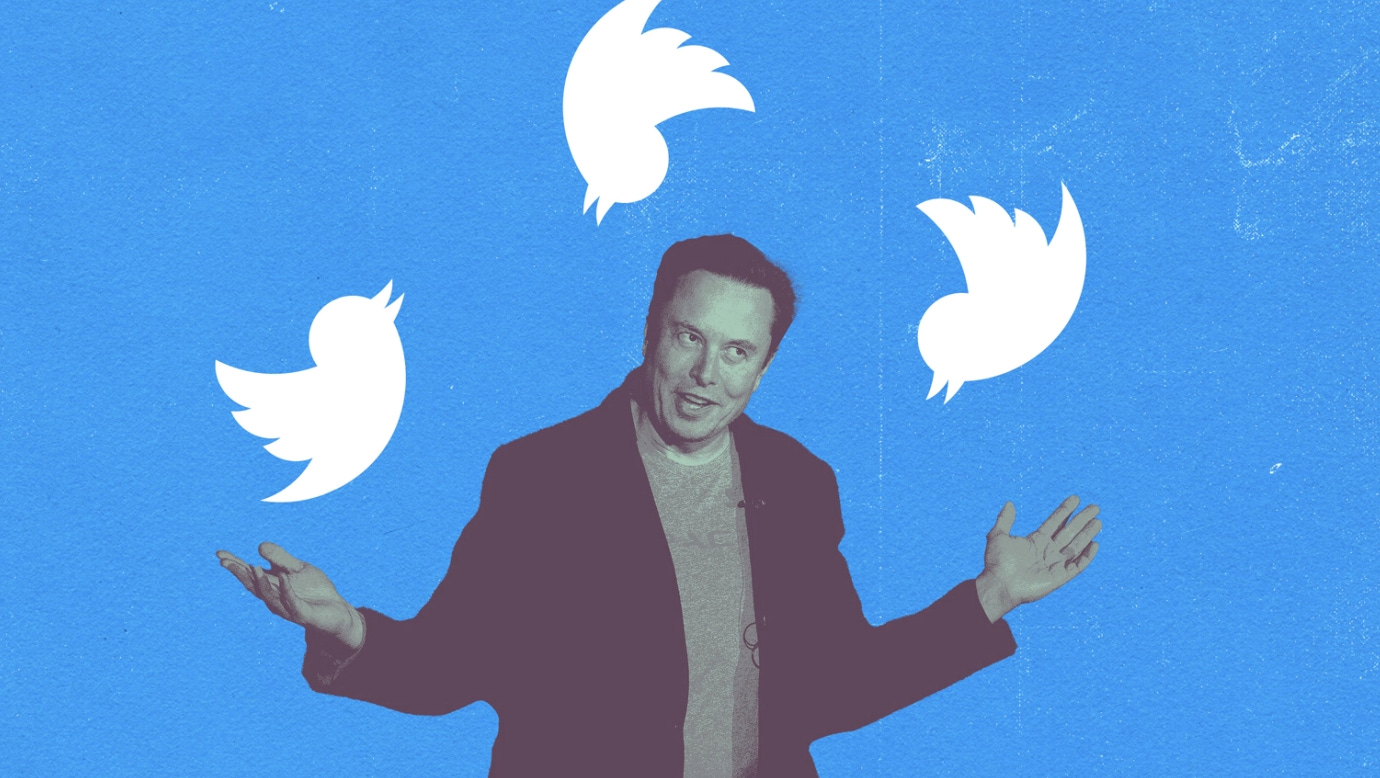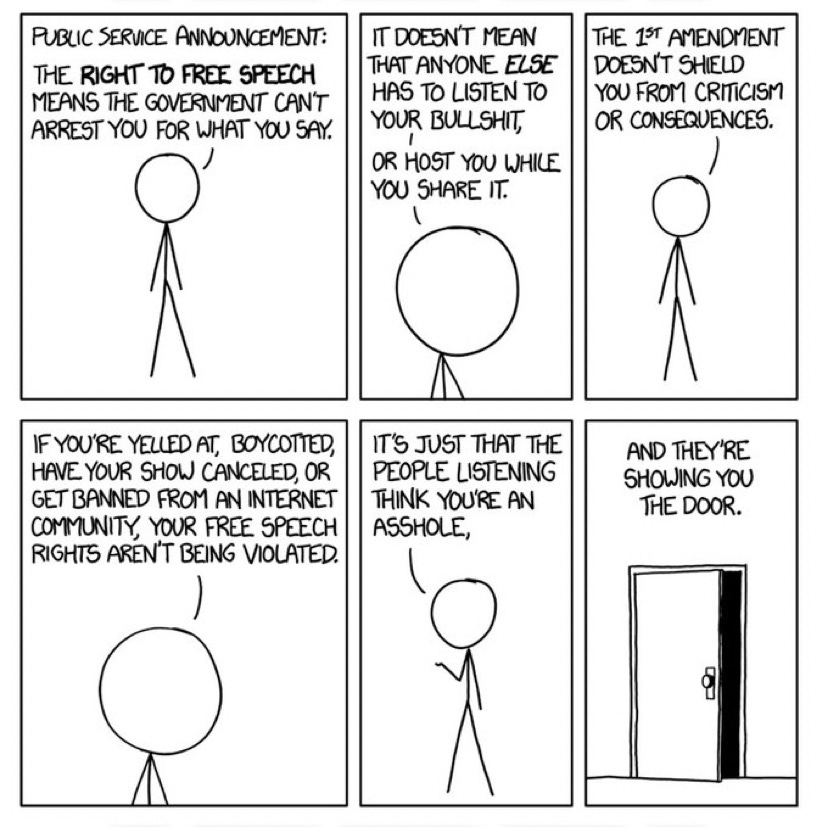Can there be free speech on social media? [HTC #47]
Navigating the controversy surrounding Twitter
Image Source: Jim Watson/AFP/ (collage by TechCrunch) / Getty Images
In less than two decades, social media platforms like Twitter and Facebook have grown from communication platforms to shaping entire information ecosystems and controlling what gets seen by billions across the world. Elon Musk’s recent takeover has once again brought up questions about the power of social media platforms and what it means for free speech and content regulation. But is the heart of the issue really that of free speech?
What is free speech on social media?
In the era of hate speech and misinformation, there is a constant balancing act between restricting content and allowing free speech on social media platforms. After Elon Musk’s recent takeover of Twitter, conversations surrounding this topic have only been reignited.
The tech billionaire’s vision for Twitter involves it being a “de facto town square” where people have “both the reality and the perception that they are able to speak freely within the bounds of the law”. Though free speech laws vary by country, this idea of being able to speak freely in the US goes back to the First Amendment. However, it is also important to note that as a private company, Twitter is not required to follow the First Amendment.
Should social media companies decide what is free speech?
Musk’s opinions about Twitter are misaligned with Twitter’s previous policies and other social media companies that have content rules stricter than First Amendment standards. Facebook, for example, removes content that is seen as “violent or dehumanizing speech, harmful stereotypes, statements of inferiority, expressions of contempt, disgust or dismissal, cursing and calls for exclusion or segregation”.
In 2019, Zuckerberg famously claimed that he doesn’t believe Facebook should be making decisions about restricting speech. Two years later, former US President Donald Trump started using his platform to spread misinformation and spark violence, prompting multiple social media platforms to ban him, forcing Zuckerberg to go back on his words.
This controversial decision erupted calls from the Republican political base. World leaders around the world were also quick to criticize the move, saying that private companies should not have the power to decide who gets the freedom of opinion.
Free speech and content moderation
Back in May, Musk claimed that he would “reverse the permanent ban” of Trump on Twitter, calling the ban a “mistake” as it “alienated a large part of the country.”
The self-proclaimed “free-speech absolutist” has openly criticized Twitter's policies that monitor content on the site, originally claiming that he would work to remove them. This caused widespread concerns that aligning Twitter’s content rules with the First Amendment would lead to an outbreak of hate speech and misinformation on the platform. These concerns became reality, as in the hours after Musk took over Twitter, the Network Contagion Research Institute (NCRI) reported that there was a spike in hate speech on the platform.
Musk’s criticism of Twitter's policies provoked warnings from the top EU commissioner that free speech on Twitter will still have to abide by The Digital Services Act laws on disinformation and illegal content, raised even more concerns about the future of Twitter and what it means to protect free speech.
RAISO Opinion: Is the bird really free?
Imagine a town square where mean and angry people are shouting. They’re actively promoting violence against those that don’t agree with their opinions and trying to manipulate others using falsehoods. Now, imagine these people have loudspeakers and everything they’re saying is amplified and broadcasted everywhere. Would you want to speak up in this town square?
Musk seems to understand that not everyone would want to participate in such a town square. In a tweet containing screenshots of paragraphs on a notepad posted on October 27, Musk explains his intentions for purchasing Twitter and tries to placate the worries that Twitter would become unbearable:
“The reason I acquired Twitter is because it is important to the future of civilization to have a common digital town square, where a wide range of beliefs can be debated in a healthy manner, without resorting to violence…. Twitter obviously cannot become a free-for-all hellscape, where anything can be said with no consequences”
Though Musk previously gave the impression that he was cutting down on content moderation to protect free speech, he’s seemed to have U-turned in his opinions. On October 28, he tweeted that he would be forming a new “content moderation council” and that no content decisions or account reinstatements would occur before this council was formed. Though these are vague plans, it seems that even Musk agrees that free speech on social media doesn’t mean everyone can say anything with no consequences.
So then, is the issue of free speech really an issue? I argue that the issue isn’t one of speech, but of reach.
With the debate on free speech and content moderation the focus of Musk’s takeover of Twitter, less attention has been given to Musk’s other proposed changes to the platform. I was most interested in his vague suggestion to make Twitter’s algorithm open source, meaning that the code behind the algorithm would be available for everyone to see. This gave the impression that he wanted more transparency on how Twitter promotes content. However, it doesn’t seem like Musk would follow through with this idea: during Musk’s recent mass firing of Twitter employees, he disbanded the team working to make the algorithm more transparent and fair.
At the core of every social media platform is its algorithm that makes millions of decisions per second about what information users see on their screen. They’re designed to amplify content that is provocative and keeps the user on the platform for longer, so content involving violence, misinformation and hate speech is able to flourish. From recommending QAnon conspiracies and stoking the Capitol Hill riots, we’ve seen how content promoted by these algorithms has real-world consequences.
Companies are understandably secretive about how their algorithms work, as they are the backbone of every social media platform's business model. Due to the power of these algorithms to promote content to millions of people, it is important for us to recognize that the issue with social media platforms is not one of speech, but one of reach.
Musk demonstrated the issue of reach when he tweeted a conspiracy theory about the attack on Paul Pelosi that linked to a faux newspaper. This wouldn’t have been an issue if he was a small account with no followers– except he had tweeted this to 114 million followers. He later deleted the tweet, but doesn't the act of Twitter’s owner posting misinformation to millions of people, many of whom are his devout followers, seem like the start of a free-for-all hellscape?
Conclusion
Musk frequently likens Twitter to a town square, but in reality it is more like the megaphone that decides which voices get to be the loudest. Thus, we need to consider these platforms as what they truly are: platforms not just for sharing content, but controlling what content gets seen. Instead of focusing on the regulation of speech, we need to focus on the regulation of reach. Undoubtedly, free speech is a vital issue regarding the future of Twitter that is currently dominating headlines, but there has to be more scrutiny on Musk’s plans for the Twitter algorithm if we want Twitter to not become a free-for-all hellscape.
Coming Soon…
Thanks for reading and supporting this community. We know many of you reading came from participating in our ice cream challenge. Interested in another game? Well, you’re in luck!
Regardless of how you subscribed, anyone is eligible to play our upcoming crossword game. Stay tuned for a future announcement with more details! As a reward for making it this far, here’s a headstart to the game: the answer to question 12 on the crossword is Turtle.
Love HTC?❤️
Follow RAISO (our parent org) on social media for more updates, discussions, and events!
Instagram: @Raisogram
Twitter: @raisotweets
RAISO Website: https://www.raiso.org
Written by Zoey Soh




